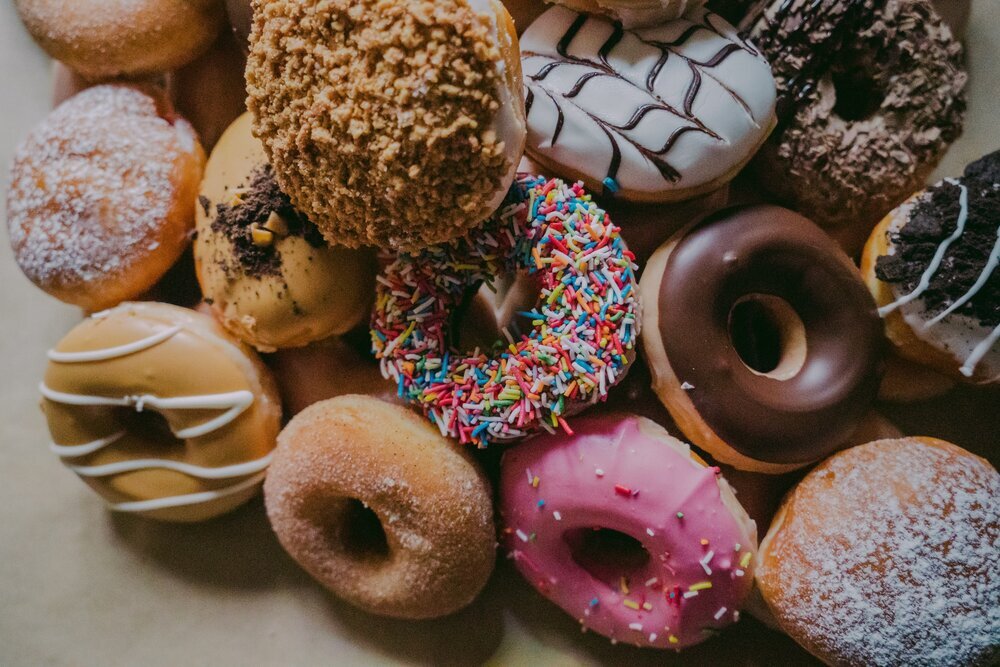Stop Overeating Junk Food
Hey guys, Nate here.
It's inevitable — humans are addicted to pleasure. Processed foods are scientifically engineered to be irresistible and conveniently consumed (though not conveniently digested) in large quantities. If you can't stop, then the chips or cookies are beating you, and if you can't tell already, your health will suffer from it.
If you feel out of control right now, know that you aren't crazy. Sometimes, I even feel out of control, and I crave junk food. This is where willpower comes into play. If you show up to a work potluck with quinoa and a fresh kale salad, you're already setting that healthy-eating tone in your mind. Just don't let yourself go and inhale a plate of peanut butter marshmallow things for two minutes of gratification.
Certain foods are specifically designed to make us overeat. How messed up is that? We’re supposed to feel good while eating these foods, but in reality, they’re killing us. How do we keep this from happening?
We don't let them — in this post, Remi and I want to arm you with a few strategies you can use to stay in control and get more from your food and fitness.
Are Processed Foods Really That Bad?
YES.
Processed foods go through an extrusion process that strips grains of any and all nutrients and enzymes. After that, they are layered with flavor enhancers like MSG to amplify the flavor extremely cheaply without having to use actual whole food ingredients like fruits or veggies.
Human brains are drawn to bright colors, so naturally, the food industry makes their products colorful to grab your attention. On the nutrition label of processed foods, you'll sometimes see ingredients like "Yellow-5" or "Red-40." I don't know what the hell Yellow-5 or Red-40 is, but I definitely don't want it in my body.
Healthy natural fats, such as avocado oil, coconut oil, and ghee, will go rancid eventually. That's why food manufacturers also coat their products with hydrogenated oils to increase the products' shelf life. If a product can sit on a shelf for a year without expiring, you can only imagine how long it will sit inside your gut.
Processed foods are highly craveable, immediately gratifying, fun to eat, and easy to over-consume. Because they are so easy to consume, you have to chew less, which in turn means you eat more than you should.
Not only are they easy to eat, but they're also so cheap. Many people say that the reason they don't eat healthy foods is because they're just too expensive. Processed foods, on the other hand, are the cheapest stuff in the store. This infuriates me.
Here's the thing — even though healthy food is more financially expensive, the missing variable here is the "health tax" — meaning that if you eat processed foods consistently, eventually you will pay the price with your health. You'll be tired all the time, moody, gain weight, and experience other health defects like high cholesterol and risk of a heart attack. Remember that next time you're comparing a pound of grass-fed beef to a Big Mac. One is cheaper, yes, but it will cost you in the long run.
How Our Evolution Is Harming Our Health
Once upon a time, food was not so abundant. To find food, our ancient ancestors had to scavenge and hunt, which was extremely challenging. To do this effectively and safely, they evolved survival instincts along the way.
For example, sweet things tended NOT to be poisonous. Therefore, our ancestors stored a preference for sweet and starchy foods in their brains. Babies and children are particularly attracted to sweeter foods, which is likely a built-in safety mechanism to prevent poisoning. Fat is also a preferred nutrient since it's very high-calorie and would be a jackpot for starving hunters and gatherers. As a result, fat is another stored preference in our brains.
Today, of course, we don't exactly have to run, climb, dig, and hike for nine hours before we get to eat. Instead, we can roll up to a drive-thru window and order up a combo of flavors that we’re primed to love and enjoy them in our cars. Or, if that's too hard, you can have someone hand-deliver your food to your front door.
In this modern age, our lifestyles don't always require the high-fat diets that we used to prefer in ancient times. And while sweet things used to be safe, they are now the exact opposite. Evolution now works against us.
The question becomes, how can we break out of it?
Awareness = POWER: How to Develop Better Food Habits
The first step to breaking this vicious cycle is awareness (and I hope this blog post has provided some of that for you). Once you are aware of how your body works, what it craves, and why processed foods are bad for you, you can start to really deal with the problem. Here are some tips that will help you break out of bad food habits:
#1. Practice HARA-HACHI-BU
You may have heard Remi talk about this concept before — Hara Hachi Bu is the Japanese art of eating, which contributes to a long life. Basically, it means to eat until you are 80% full. Be present and mindful as you chew — this allows your brain to keep up with your belly. If you're mindlessly eating, it's really easy to stuff yourself without even realizing it.
A healthy relationship takes work from BOTH parties — if you expect your food to work for you, you have to work for your food by chewing slowly and with intention. When you eat until you're 80% full, you're giving your stomach a chance to properly digest and energize you, instead of making you sluggish and slow.
When you consume wholesome nutrients such as lean protein, broccoli, and apples, you will notice that they require you to expend energy. It takes far more chewing and effort than that of tossing a potato chip into your mouth. Be patient. Savor your food, and give your body time to digest.
#2. Look for Patterns in Your Eating
Humans are creatures of habit. It's easy to fall into the trap of emotional binge eating, and when you do this long enough, it becomes part of your everyday routine. When you're sad, a cookie will give you temporary comfort, but if that turns into a habit, it leads to a slippery slope.
Take time to examine your eating habits — do you eat junk food when you're sad? Do you crave sugar when you're tired? Don't use food for reasons other than physical nourishment. Habits are powerful, for better or for worse. They can work for us or against us.
#3. Surround Yourself with Foods That Support Your Goals
Do you want to lose weight? Do you want to have more consistent energy throughout the day? Do you want to build lean muscle? Junk food isn't going to get you there. In fact, it's going to get you further and further from your goals.
Instead, invest in foods that will work for you — whole, unprocessed foods. Yes, they are more expensive, but what do you value more? A healthy lifestyle or a temporary fix?
We can almost feel "high" when we eat processed foods. But that high wears off, and we're left with lethargy and a food coma. Whole foods, on the other hand, regulate food intake and also improve nutrition. They're more subtle in flavor and take more effort to chew and digest. Instead of feeling high, whole foods replenish our bodies and energize them sustainably. Whole foods will undoubtedly require more planning and preparation, but in ten minutes, you can easily cut up some veggies, boil some eggs, cook some oatmeal, and marinate some chicken breasts to use the next day.
Yes, this is more work. But as I always say, "Prior Proper Planning Prevents Piss-Poor Performance." If you're setting healthy goals for yourself, you're going to get there by investing in whole foods and cutting out the junk.
Red Light, Yellow Light, Green Light
Before I end, I want to make this important point — cutting out all unprocessed foods is difficult, even for myself. There are some processed foods that are okay to consume every once in a while and others that you should 100% stay away from. To give you a better picture of this, Remi and I created this graphic to illustrate:
RED LIGHT: Strongly Limit These Foods
Fries, chips, microwave popcorn
Burgers with over-processed meats (AKA not grass-fed)
Most fast food
Frozen, prepackaged meals
Packaged sugary treats, such as chocolate cake, swiss rolls, etc.
Pretty much anything with a long ingredient list in the nutritional facts
Yellow Light: Enjoy in Moderation
Milk
Cheese (the less processed, the better)
Crackers (preferably those with whole grains)
Low-sodium beans
Yogurt
Dark chocolate
Green Light: Eat for Maximum Performance and Recovery
Avocado
Salmon
Kale
Rice
Quinoa
Eggs
Vegetables and fruits (not frozen)
The foods listed above are just examples — I could have filled this entire post with a list of what you should and shouldn't eat. Bottom line — stay away from processed foods as much as you can and stick to whole foods to look good, feel well, and move good.
Hope this helps, guys. If you have any questions or any health tips to add, you can tag me, @nates_beard, and Remi, @rrayyme, on Instagram. Also, subscribe to Remi's YouTube channel, where she shares tons of health tips and our favorite wholefood recipes. And check out our workout program HōmeBodies to learn more tips about a healthy lifestyle (while also getting fit as hell).
Talk to you all later —
Nate







